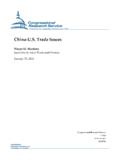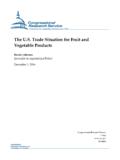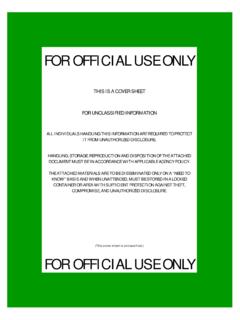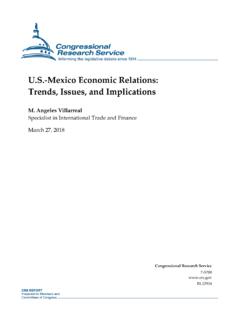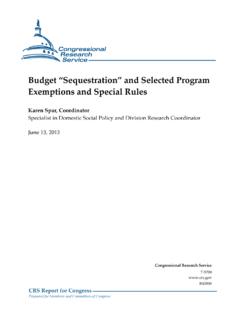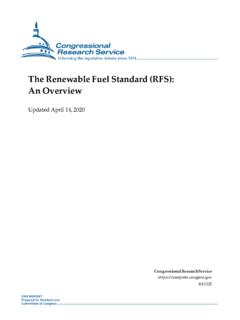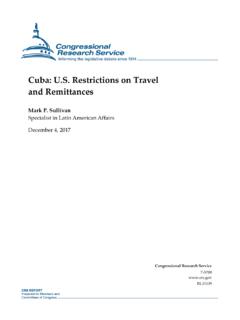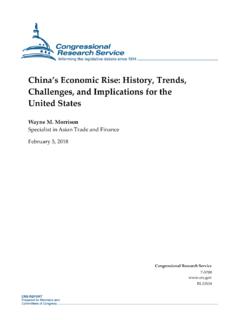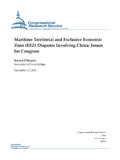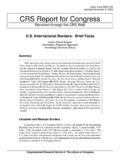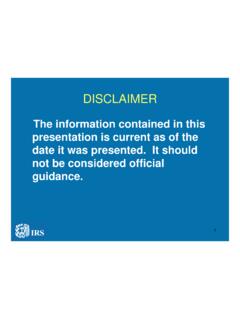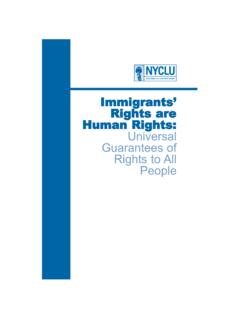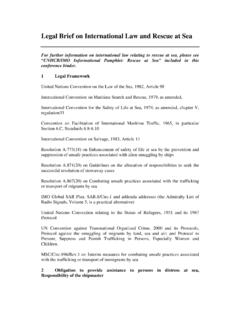Transcription of Noncitizen Eligibility for Federal Public Assistance ...
1 Noncitizen Eligibility for Federal Public Assistance : Policy Overview Alison Siskin Specialist in Immigration Policy December 12, 2016 Congressional Research Service 7-5700 RL33809 Noncitizen Eligibility for Federal Public Assistance : Policy Overview Congressional Research Service Summary The extent to which residents of the United States who are not citizens should be eligible for federally funded Public aid has been a contentious issue since the 1990s. This issue meets at the intersection of two major policy areas: immigration policy and welfare policy.
2 The Eligibility of noncitizens for Public Assistance programs is based on a complex set of rules that are determined largely by the category of the Noncitizen in question and the nature of services being offered. Over the past 20 years, Congress has enacted significant changes in immigration policy and welfare policy. Congress has also exercised oversight of revisions made by the 1996 welfare reform law (the Personal Responsibility and Work Opportunity Reconciliation Act, 104-193) concerning the rules governing Noncitizen Eligibility for Public Assistance , and of legislation covering programs with major restrictions on Noncitizen Eligibility ( , Medicaid).
3 This report deals with the four major Federal means-tested benefit programs: the Supplemental Nutrition Assistance Program (SNAP, formerly food stamps), the Supplemental Security Income (SSI) program, Temporary Assistance for Needy Families (TANF) cash Assistance , and Medicaid. Laws in place for the past 20 years restrict the Eligibility of legal permanent residents (LPRs), refugees, asylees, and other noncitizens for most means-tested Public aid. Noncitizens Eligibility for major Federal means-tested benefits largely depends on their immigration status; whether they arrived (or were on a program s rolls) before August 22, 1996, the enactment date of 104-193; and how long they have lived and worked in the United States.
4 LPRs with a substantial work history (defined as 40 quarters of Social Security covered earnings) or military connection are eligible for the full range of programs, as are asylees, refugees, and other humanitarian cases (for at least five to seven years after entry). Other LPRs must meet additional Eligibility requirements. For SSI, they are not eligible for the first five years even if they had a substantial work history ( , as a temporary worker prior to receiving LPR status). For SNAP, they generally must have been LPRs for five years or be under age 18.
5 Under TANF, they generally are ineligible for five years after entry and then eligible at state option. States have the option of providing Medicaid to pregnant LPRs and children within the five-year bar; otherwise LPRs are ineligible for the first five years. Unauthorized aliens (often referred to as illegal aliens) are not eligible for most Federal benefits, regardless of whether they are means tested, with notable exceptions for emergency services ( , Medicaid for emergency medical care or Federal Emergency Management Agency disaster services).
6 This report does not track legislation and will be updated as policy changes warrant. Noncitizen Eligibility for Federal Public Assistance : Policy Overview Congressional Research Service Contents Introduction .. 1 Current Eligibility Policy .. 1 Citizens of the Freely Associated States .. 3 Related Immigrant Policies Affecting Eligibility .. 4 Deeming Rules .. 4 Systematic alien Verification for Entitlements (SAVE) system .. 5 Federal and State Benefit Eligibility Standards for Unauthorized Aliens.
7 5 Federal Benefits .. 5 State Benefits .. 6 Appendixes Appendix A. Noncitizen Eligibility for Selected Major Federal Programs .. 8 Appendix B. Overview of alien Eligibility Law .. 11 Appendix C. Qualified Aliens .. 16 Contacts Author Contact Information .. 17 Acknowledgments .. 17 Noncitizen Eligibility for Federal Public Assistance : Policy Overview Congressional Research Service 1 Introduction The extent to which residents of the United States who are not citizens should be eligible for federally funded Public aid has been a contentious issue since the 1990s.
8 This issue meets at the intersection of two major policy areas: immigration policy and welfare policy. Over the past 20 years, Congress has enacted significant changes in both areas. Congress has also exercised oversight of revisions made by the 1996 welfare reform law (the Personal Responsibility and Work Opportunity Reconciliation Act, 104-193) concerning the rules governing Noncitizen Eligibility for Public Assistance , and of legislation covering programs with major restrictions on Noncitizen Eligibility ( , Medicaid).
9 This report covers Noncitizen Eligibility in the four major Federal means-tested benefit programs: the Supplemental Nutrition Assistance Program (SNAP, formerly food stamps), the Supplemental Security Income (SSI) program, Temporary Assistance for Needy Families (TANF) cash Assistance , and Medicaid. It is organized into three main parts: an overview of existing Eligibility law for the four programs and the policies that preceded the 1996 act; an overview of related immigrant policies affecting Eligibility (specifically, the treatment of sponsored aliens);1 and a summary of the Eligibility rules for aliens residing in the United States illegally.
10 Appendices elaborate on the specifics of current Eligibility rules for the four major programs. Among other things, Title IV of the Personal Responsibility and Work Opportunity Reconciliation Act of 1996 (PRWORA, 104-193) established comprehensive restrictions on the Eligibility of noncitizens for means-tested Public Assistance with significant exceptions for those with a substantial work history or military connection. For legal permanent residents (LPRs)2 who were resident as of enactment of the law (August 22, 1996), the act generally had barred Eligibility (SNAP and SSI) or had allowed it at state option (Medicaid and TANF).
